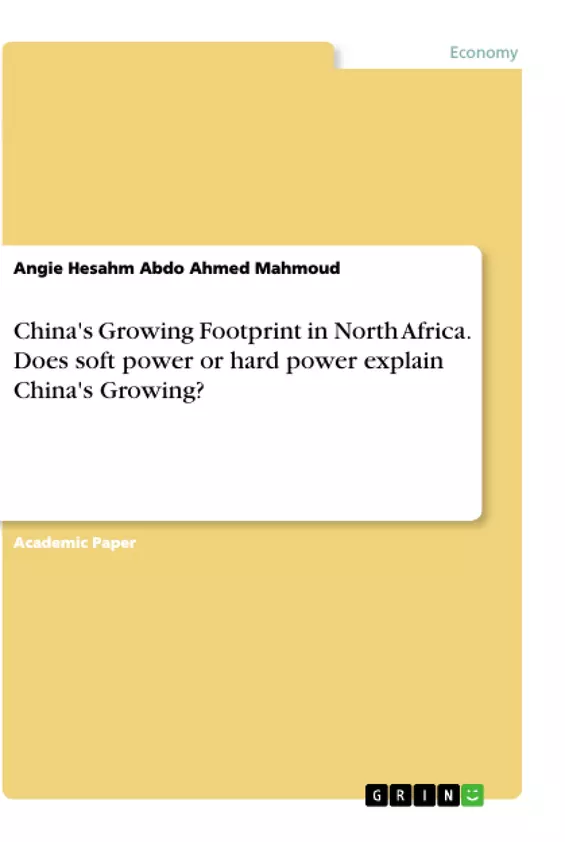This paper discusses the growing influence of China in North Afrcia. China has developed a profoundly entrenched stance as both a diplomatic partner and a rising investor in Africa. The interests of the Chinese in the continent covers not only natural resources but also pressing matters of trade, security, combating terrorism, and soft power which entails Confucius institutes and people to people exchanges.
Chinese aid practices to Africa which encompasses Chinese medical fleet has been blown out of proportion by Western media to influence Africa to take caution and shield itself from China. The expression "soft power" has turned into a political theory for types of impact that are not "hard" in the sense of military power. As indicated by Joseph Nye's unique definition, a nation's hard power depends on intimidation, to a great extent a component of its military or monetary might. "Soft power", conversely, depends on fascination, emerging from the positive intrigue of a nation's way of life, political goals, and strategies just as a dynamic, free affable society.
Inhaltsverzeichnis (Table of Contents)
- Does Soft Power or Hard Power Explain China's Growing Footprint in North Africa? Or Does So-called 'Sharp Power' Better Explain This? Critically Analyze the Former and the Latter
- Hard, Soft, and Sharp Power
- China’s Growing Footprint in Africa
- China’s Soft and Hard Power
- A Post-Colonial Hypothesis
Zielsetzung und Themenschwerpunkte (Objectives and Key Themes)
This essay critically analyzes the relationship between China and Africa, examining whether soft power or hard power better explains China's growing footprint in North Africa. The essay also explores the concept of "sharp power" and its relevance to China's influence in the region.
- The concepts of hard, soft, and sharp power
- China's strategic interests in Africa
- China's economic and political influence in Africa
- The role of Western media in shaping perceptions of China's engagement in Africa
- The potential for China's growing influence to shape the future of global politics
Zusammenfassung der Kapitel (Chapter Summaries)
- The first chapter introduces the concepts of hard, soft, and sharp power, outlining their key features and differences. It explores how these different power dynamics can be applied to understand China's relationship with Africa.
- The second chapter examines China's growing footprint in Africa, focusing on its economic and political interests. It analyzes the motivations behind China's engagement with the continent, highlighting both potential benefits and concerns.
- The third chapter delves into the concept of "sharp power," analyzing its implications for China's relationship with Africa. It explores how China's soft power initiatives are intertwined with more coercive measures.
- The fourth chapter examines a post-colonial hypothesis, suggesting that China's interests in Africa are not fundamentally different from those of other industrialized countries. It explores the role of Western media in shaping perceptions of China's engagement.
Schlüsselwörter (Keywords)
This essay focuses on the concepts of hard power, soft power, and sharp power, analyzing their application to the case of China's growing footprint in North Africa. It explores key themes such as China's strategic interests in Africa, its economic and political influence, and the role of Western media in shaping perceptions of China's engagement in the region.
Frequently Asked Questions
What is the difference between "soft power" and "hard power"?
Hard power relies on coercion, military might, or economic sanctions, while soft power depends on attraction through culture, political values, and diplomacy.
What is "sharp power" in the context of China's foreign policy?
Sharp power refers to the use of manipulative diplomatic policies and information warfare to influence the internal politics of other countries, often bridging the gap between soft and hard power.
What are China's primary interests in North Africa?
China's interests include securing natural resources, expanding trade, enhancing security cooperation, and building influence through cultural exchanges like Confucius Institutes.
How does Western media portray Chinese aid to Africa?
The essay suggests that Western media often portrays Chinese aid as a threat or "debt trap," encouraging African nations to be cautious of China's growing influence.
What are Confucius Institutes?
They are public educational partnerships between colleges and universities in China and other countries, serving as a key tool for Chinese soft power and cultural diplomacy.
- Arbeit zitieren
- Angie Hesahm Abdo Ahmed Mahmoud (Autor:in), 2020, China's Growing Footprint in North Africa. Does soft power or hard power explain China's Growing?, München, GRIN Verlag, https://www.grin.com/document/956405



